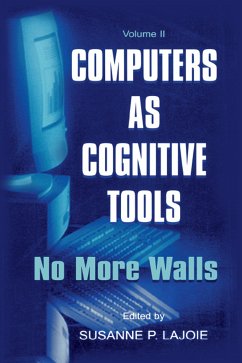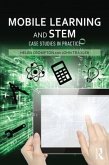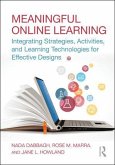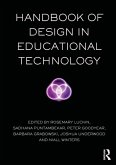Computers as Cognitive Tools
Volume II No More Walls
Herausgeber: Lajoie, Susanne P
Computers as Cognitive Tools
Volume II No More Walls
Herausgeber: Lajoie, Susanne P
- Broschiertes Buch
- Merkliste
- Auf die Merkliste
- Bewerten Bewerten
- Teilen
- Produkt teilen
- Produkterinnerung
- Produkterinnerung
Volume II provides the reader with examples of state-of-the-art technology-based research in the fields of education & training. Researchers represented include computer scientists, cognitive scientists, educ psychologists & instructional psychologists.
Andere Kunden interessierten sich auch für
![The Mindful Schools Curriculum for Adolescents: Tools for Developing Awareness The Mindful Schools Curriculum for Adolescents: Tools for Developing Awareness]() Oren Jay SoferThe Mindful Schools Curriculum for Adolescents: Tools for Developing Awareness35,99 €
Oren Jay SoferThe Mindful Schools Curriculum for Adolescents: Tools for Developing Awareness35,99 €![Tools for Teaching in an Educationally Mobile World Tools for Teaching in an Educationally Mobile World]() Jude CarrollTools for Teaching in an Educationally Mobile World76,99 €
Jude CarrollTools for Teaching in an Educationally Mobile World76,99 €![Mobile Learning and Stem Mobile Learning and Stem]() Mobile Learning and Stem65,99 €
Mobile Learning and Stem65,99 €![Applied Cognitive Research in K-3 Classrooms Applied Cognitive Research in K-3 Classrooms]() Catherine A. Fiorello / Ken Thurman (eds.)Applied Cognitive Research in K-3 Classrooms76,99 €
Catherine A. Fiorello / Ken Thurman (eds.)Applied Cognitive Research in K-3 Classrooms76,99 €![Technology's Challenges and Solutions in K-16 Education During a Worldwide Pandemic Technology's Challenges and Solutions in K-16 Education During a Worldwide Pandemic]() Technology's Challenges and Solutions in K-16 Education During a Worldwide Pandemic53,99 €
Technology's Challenges and Solutions in K-16 Education During a Worldwide Pandemic53,99 €![Meaningful Online Learning Meaningful Online Learning]() Nada DabbaghMeaningful Online Learning72,99 €
Nada DabbaghMeaningful Online Learning72,99 €![Handbook of Design in Educational Technology Handbook of Design in Educational Technology]() Handbook of Design in Educational Technology160,99 €
Handbook of Design in Educational Technology160,99 €-
-
-
Volume II provides the reader with examples of state-of-the-art technology-based research in the fields of education & training. Researchers represented include computer scientists, cognitive scientists, educ psychologists & instructional psychologists.
Hinweis: Dieser Artikel kann nur an eine deutsche Lieferadresse ausgeliefert werden.
Hinweis: Dieser Artikel kann nur an eine deutsche Lieferadresse ausgeliefert werden.
Produktdetails
- Produktdetails
- Verlag: Taylor & Francis
- 2nd edition
- Seitenzahl: 464
- Erscheinungstermin: 1. Juni 2000
- Englisch
- Abmessung: 231mm x 154mm x 35mm
- Gewicht: 744g
- ISBN-13: 9780805829310
- ISBN-10: 0805829318
- Artikelnr.: 22180532
- Herstellerkennzeichnung
- Libri GmbH
- Europaallee 1
- 36244 Bad Hersfeld
- gpsr@libri.de
- Verlag: Taylor & Francis
- 2nd edition
- Seitenzahl: 464
- Erscheinungstermin: 1. Juni 2000
- Englisch
- Abmessung: 231mm x 154mm x 35mm
- Gewicht: 744g
- ISBN-13: 9780805829310
- ISBN-10: 0805829318
- Artikelnr.: 22180532
- Herstellerkennzeichnung
- Libri GmbH
- Europaallee 1
- 36244 Bad Hersfeld
- gpsr@libri.de
Susanne P. Lajoie,
Contents: Preface. S.P. Lajoie
Introduction: Breaking Camp to Find New Summits. Part I: Technologies for Supporting Knowledge Building in Distributed Learning Contexts.F.N. Akhras
J.A. Self
Modeling the Process
Not the Product
of Learning. S.J. Derry
S. Gance
L.L. Gance
M. Schlager
Toward Assessment of Knowledge-Building Practices in Technology-Mediated Work Group Interactions. J. Greer
G. McCalla
J. Cooke
J. Collins
V. Kumar
A. Bishop
J. Vassileva
Integrating Cognitive Tools for Peer Help: The Intelligent Intranet Peer Help-Desk Project. B.Y. White
T.A. Shimoda
J.R. Frederiksen
Facilitating Students' Inquiry Learning and Metacognitive Development Through Modifiable Software Advisers. B. Sugrue
Cognitive Approaches to Web-Based Instruction. Part II: Cognitive Tools That Foster New Forms of Representation.D.H. Jonassen
C.S. Carr
Mindtools: Affording Multiple Knowledge Representations for Learning. J. Erickson
R. Lehrer
What's in a Link? Student Conceptions of the Rhetoric of Association in Hypermedia Composition. B. Harper
J. Hedberg
B. Corderoy
R. Wright
Employing Cognitive Tools Within Interactive Multimedia Applications. S.P. Lajoie
R. Azevedo
Cognitive Tools for Medical Informatics. D.L. Schwartz
G. Biswas
J.D. Bransford
B. Bhuva
T. Balac
S. Brophy
Computer Tools That Link Assessment and Instruction: Investigating What Makes Electricity Hard to Learn. V.J. Shute
L.A. Torreano
R.E. Willis
DNA: Toward an Automated Knowledge Elicitation and Organization Tool. Part III: Epilogue.B. du Boulay
Fallible
Distractible
Forgetful
Willful
and Irrational Learners. E.B. Mandinach
H.F. Cline
It Won't Happen Soon: Practical
Curricular
and Methodological Problems in Implementing Technology-Based Constructivist Approaches in Classrooms. Part IV: Discussion.A. Lesgold
What Are the Tools For? Revolutionary Change Does Not Follow the Usual Norms.
Introduction: Breaking Camp to Find New Summits. Part I: Technologies for Supporting Knowledge Building in Distributed Learning Contexts.F.N. Akhras
J.A. Self
Modeling the Process
Not the Product
of Learning. S.J. Derry
S. Gance
L.L. Gance
M. Schlager
Toward Assessment of Knowledge-Building Practices in Technology-Mediated Work Group Interactions. J. Greer
G. McCalla
J. Cooke
J. Collins
V. Kumar
A. Bishop
J. Vassileva
Integrating Cognitive Tools for Peer Help: The Intelligent Intranet Peer Help-Desk Project. B.Y. White
T.A. Shimoda
J.R. Frederiksen
Facilitating Students' Inquiry Learning and Metacognitive Development Through Modifiable Software Advisers. B. Sugrue
Cognitive Approaches to Web-Based Instruction. Part II: Cognitive Tools That Foster New Forms of Representation.D.H. Jonassen
C.S. Carr
Mindtools: Affording Multiple Knowledge Representations for Learning. J. Erickson
R. Lehrer
What's in a Link? Student Conceptions of the Rhetoric of Association in Hypermedia Composition. B. Harper
J. Hedberg
B. Corderoy
R. Wright
Employing Cognitive Tools Within Interactive Multimedia Applications. S.P. Lajoie
R. Azevedo
Cognitive Tools for Medical Informatics. D.L. Schwartz
G. Biswas
J.D. Bransford
B. Bhuva
T. Balac
S. Brophy
Computer Tools That Link Assessment and Instruction: Investigating What Makes Electricity Hard to Learn. V.J. Shute
L.A. Torreano
R.E. Willis
DNA: Toward an Automated Knowledge Elicitation and Organization Tool. Part III: Epilogue.B. du Boulay
Fallible
Distractible
Forgetful
Willful
and Irrational Learners. E.B. Mandinach
H.F. Cline
It Won't Happen Soon: Practical
Curricular
and Methodological Problems in Implementing Technology-Based Constructivist Approaches in Classrooms. Part IV: Discussion.A. Lesgold
What Are the Tools For? Revolutionary Change Does Not Follow the Usual Norms.
Contents: Preface. S.P. Lajoie
Introduction: Breaking Camp to Find New Summits. Part I: Technologies for Supporting Knowledge Building in Distributed Learning Contexts.F.N. Akhras
J.A. Self
Modeling the Process
Not the Product
of Learning. S.J. Derry
S. Gance
L.L. Gance
M. Schlager
Toward Assessment of Knowledge-Building Practices in Technology-Mediated Work Group Interactions. J. Greer
G. McCalla
J. Cooke
J. Collins
V. Kumar
A. Bishop
J. Vassileva
Integrating Cognitive Tools for Peer Help: The Intelligent Intranet Peer Help-Desk Project. B.Y. White
T.A. Shimoda
J.R. Frederiksen
Facilitating Students' Inquiry Learning and Metacognitive Development Through Modifiable Software Advisers. B. Sugrue
Cognitive Approaches to Web-Based Instruction. Part II: Cognitive Tools That Foster New Forms of Representation.D.H. Jonassen
C.S. Carr
Mindtools: Affording Multiple Knowledge Representations for Learning. J. Erickson
R. Lehrer
What's in a Link? Student Conceptions of the Rhetoric of Association in Hypermedia Composition. B. Harper
J. Hedberg
B. Corderoy
R. Wright
Employing Cognitive Tools Within Interactive Multimedia Applications. S.P. Lajoie
R. Azevedo
Cognitive Tools for Medical Informatics. D.L. Schwartz
G. Biswas
J.D. Bransford
B. Bhuva
T. Balac
S. Brophy
Computer Tools That Link Assessment and Instruction: Investigating What Makes Electricity Hard to Learn. V.J. Shute
L.A. Torreano
R.E. Willis
DNA: Toward an Automated Knowledge Elicitation and Organization Tool. Part III: Epilogue.B. du Boulay
Fallible
Distractible
Forgetful
Willful
and Irrational Learners. E.B. Mandinach
H.F. Cline
It Won't Happen Soon: Practical
Curricular
and Methodological Problems in Implementing Technology-Based Constructivist Approaches in Classrooms. Part IV: Discussion.A. Lesgold
What Are the Tools For? Revolutionary Change Does Not Follow the Usual Norms.
Introduction: Breaking Camp to Find New Summits. Part I: Technologies for Supporting Knowledge Building in Distributed Learning Contexts.F.N. Akhras
J.A. Self
Modeling the Process
Not the Product
of Learning. S.J. Derry
S. Gance
L.L. Gance
M. Schlager
Toward Assessment of Knowledge-Building Practices in Technology-Mediated Work Group Interactions. J. Greer
G. McCalla
J. Cooke
J. Collins
V. Kumar
A. Bishop
J. Vassileva
Integrating Cognitive Tools for Peer Help: The Intelligent Intranet Peer Help-Desk Project. B.Y. White
T.A. Shimoda
J.R. Frederiksen
Facilitating Students' Inquiry Learning and Metacognitive Development Through Modifiable Software Advisers. B. Sugrue
Cognitive Approaches to Web-Based Instruction. Part II: Cognitive Tools That Foster New Forms of Representation.D.H. Jonassen
C.S. Carr
Mindtools: Affording Multiple Knowledge Representations for Learning. J. Erickson
R. Lehrer
What's in a Link? Student Conceptions of the Rhetoric of Association in Hypermedia Composition. B. Harper
J. Hedberg
B. Corderoy
R. Wright
Employing Cognitive Tools Within Interactive Multimedia Applications. S.P. Lajoie
R. Azevedo
Cognitive Tools for Medical Informatics. D.L. Schwartz
G. Biswas
J.D. Bransford
B. Bhuva
T. Balac
S. Brophy
Computer Tools That Link Assessment and Instruction: Investigating What Makes Electricity Hard to Learn. V.J. Shute
L.A. Torreano
R.E. Willis
DNA: Toward an Automated Knowledge Elicitation and Organization Tool. Part III: Epilogue.B. du Boulay
Fallible
Distractible
Forgetful
Willful
and Irrational Learners. E.B. Mandinach
H.F. Cline
It Won't Happen Soon: Practical
Curricular
and Methodological Problems in Implementing Technology-Based Constructivist Approaches in Classrooms. Part IV: Discussion.A. Lesgold
What Are the Tools For? Revolutionary Change Does Not Follow the Usual Norms.








